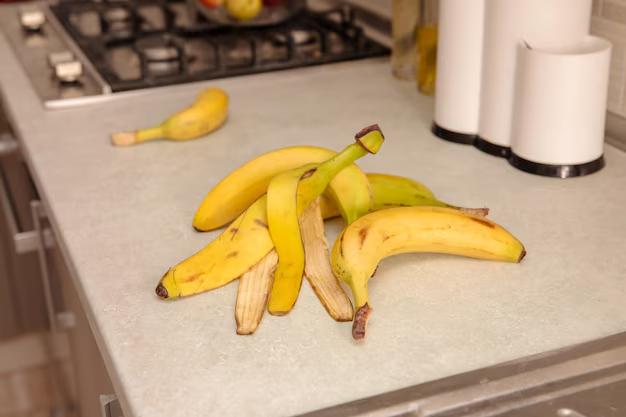Should You Refrigerate Bananas? Exploring the Do's and Don'ts of Banana Storage 🍌
Bananas are one of the most beloved fruits worldwide, known for their creamy texture, sweet flavor, and nutritional benefits. But when it comes to storing them, opinions vary greatly. Some people toss them in the fridge, while others insist they should never be chilled. So, what's the right approach? Let’s dive into all aspects of this fruit's storage to help you keep your bananas fresher for longer.
The Basics of Banana Ripening
What Happens When Bananas Ripen?
Bananas undergo a fascinating transformation as they ripen. They start off green, turning a vibrant yellow, and eventually become spotted with brown as they grow sweeter. This color change is due to the conversion of starches into sugars.
How Ethylene Gas Plays a Role
Ethylene gas, a natural plant hormone, is crucial in ripening bananas. This volatile compound accelerates the ripening process, explaining why bananas seem to ripen so quickly once you bring them home.
The Controversy of Storing Bananas in the Refrigerator
The Case Against Refrigeration
Bananas are tropical fruits, accustomed to warm climates, and not naturally suited for the cold. Placing bananas in the refrigerator can disrupt their normal ripening process. The peel quickly turns brown and unappealing, though the flesh inside may remain relatively unripe.
The Argument for Chilling Them
On the flip side, if your bananas have reached the perfect ripeness, refrigerating them can help maintain their current state. While the skin darkens, the internal fruit remains unchanged longer than if left out at room temperature.
Understanding Temperature Impact on Bananas
Room Temperature Storage: The Norm
Storing bananas at room temperature, ideally between 68-72°F (20-22°C), allows them to ripen naturally. A fruit bowl on your kitchen counter, away from direct sunlight and heat, is perfect for this purpose.
Refrigeration's Effect on Banana Texture
Refrigerating bananas too early can make them unpleasantly mushy, as the cold causes their cells to break down. This texture isn't everyone's preference, highlighting one of the main drawbacks of chilling bananas prematurely.
How to Maximize Banana Freshness
Optimal Storage Practices
- Separate Bananas: Keep bananas apart to slow down the ripening process, as clumping together increases ethylene exposure.
- Use a Banana Hanger: Hanging bananas can prevent bruising and improve airflow, slowing ripening.
- Wrap the Stems: Covering stems with plastic wrap helps contain ethylene gas, delaying ripening.
- Refrigerate Once Ripe: Consider chilling bananas only once they've become fully ripe to extend their shelf life slightly.
Freezing as an Alternative
If your bananas ripen too quickly, freezing is a fantastic option. Simply peel the bananas, slice them if desired, and freeze them in an airtight container. They make excellent additions to smoothies or baked goodies.
Related Storage Tips for Other Produce
Avocados: Timing the Chill
Similar to bananas, avocados ripen at room temperature but can benefit from refrigeration once they’ve reached perfect ripeness.
Apples and Oranges: Room Vs. Fridge
Apples can be stored in the fridge to remain crisp, whereas oranges favor a cool, dry place like a countertop.
Cooking with Overripe Bananas
Perfect for Baking
Overripe bananas are perfect for baking as their heightened sugar content enhances flavors. Banana bread, muffins, and pancakes often call for bananas that are past their visual prime.
Smoothie and Dessert Hacks
For quick uses, frozen banana slices can provide natural sweetness to smoothies or be blended into a creamy dessert, mimicking ice cream's texture.
Summarizing Banana Storage Tips 🌟
Here's a concise overview of how to handle your bananas to keep them delicious and fresh:
- 🍌 Room Temperature: Ideal for ripening; store on the counter.
- 🧊 Refrigerate Ripe Bananas: Slow down further ripening but expect the peel to brown.
- 🌡️ Avoid Early Refrigeration: Prevents texture issues.
- 🚫 Don’t Store With Ethylene Producers: Keep bananas separate from apples to slow ripening.
- ❄️ Freeze Overripe Bananas: Perfect for smoothies and baked goods.
By understanding the nuances of banana storage, you can enjoy this popular fruit at its best, reducing waste and enhancing your culinary experiences.
Bringing It All Together
In the debate over whether to refrigerate bananas, context is key. While you wouldn’t want to chill them too early, using the refrigerator strategically can help in prolonging the life of a perfectly ripe banana. Whether you’re savoring them fresh or incorporating them into recipes, the way you store bananas can significantly impact their longevity and flavor. Armed with these insights, you can confidently decide the best way to store your bananas and enjoy them in the most delicious way possible.

